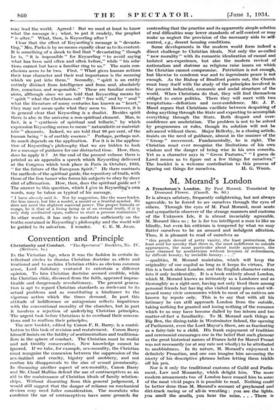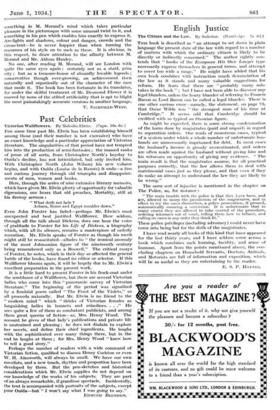M. Morand's London
A Frenchman's London. By Paul Morand. Translated by Desmond, Flower. (Cassell. 8s. 6d.) IT is always salutary, frequently enlightening, but not always agreeable, to be forced to see ourselves through the eyes of others. Through the eyes of M. Paul Morand, most acute
and sympathetic observer of the strange manners and customs of the Unknown Isle, it is. almost invariably agreeable.
M. Morand likes us ; he is far too intelligent a man to like us blindly, but even his criticism is tempered by what we may
flatter ourselves to be an amused and indulgent affection. Thus, it is pleasant to read of ourselves as
" this people devoid of petty vanity, , the least pretentious, the least avid for novelty that there is, the most indifferent to outside appearances, the most particular about inside appearance, the most charmed by aestheticism without heroism or redundance, by difficult beauty, by invisible luxury. . . ."
—qualities, M. Morand maintains, which will keep the originality of our capital as long as it keeps its virtues. For this is a book about London, and the English character enters into it only incidentally. It is a book entirely about London, which M. Morand knows as intimately as a Londoner and as thoroughly as a sight-seer, having not only lived there among personal friends but having also visited many places and wit- nessed many civic ceremonies which to most of us natives are known by repute only. This is to say that with all his intimacy he can still approach London from the outside, taking nothing for granted and losing nothing of the romance which to us may have become dulled by too inborn and too matter-of-fact a familiarity. To M. Morand such things as Big Ben, the dining-table in Westminster School, the opening of Parliament, even the Lord Mayor's Show, are as fascinating as a fairy-tale to a child. His frank enjoyment of tradition and ceremonial encourages one in the belief that such glamour as the great historical names of France held for Marcel Proust was not necessarily (or at any rate not wholly) to be attributed to snobbishness. In its nature, M. Morand's enjoyment is definitely Proustian, and one can imagine him savouring the nicety of his descriptive phrases before letting them trickle off his pen.
Nor is it only the traditional customs of Guild and Parlia- ment, Law and Monarchy, which delight him. The more modem amusements too of London have roused him to some of the most vivid pages it is possible to read. Nothing could be better- done- than M. Morand's account of greyhound and dirt-track racing or of all-in wrestling : you see-the. lights, you smell the smells, you hear the noise. . . There is something in M. Morand's mind which takes particular pleasure in the picturesque with some unusual twist to it, and something in his pen which enables him exactly to express it. Arc-lights and shadows, colour and danger, crowds and the circus-tent—he is never . happier than when turning the resources of his style on to such as these. It is obvious, in this respect, to draw attention to the affinity between M. Morand and Mr. Aldous Huxley.
No one, after reading M. Morand, will see London with quite the same eyes again ; certainly not as a staid, grim city ; but as a treasure-house of absurdly lovable legends ; conservative though ever-growing, an achievement risen naturally and organically out of the character of the race that made it.. The book has been fortunate in its translator, for under the skilful treatment of Mr. Desmond Flower it is marred by none of the stilted artificiality that is apt to blight the most painstakingly accurate versions in another language.
V. SACKVILLE-WEST.





































 Previous page
Previous page